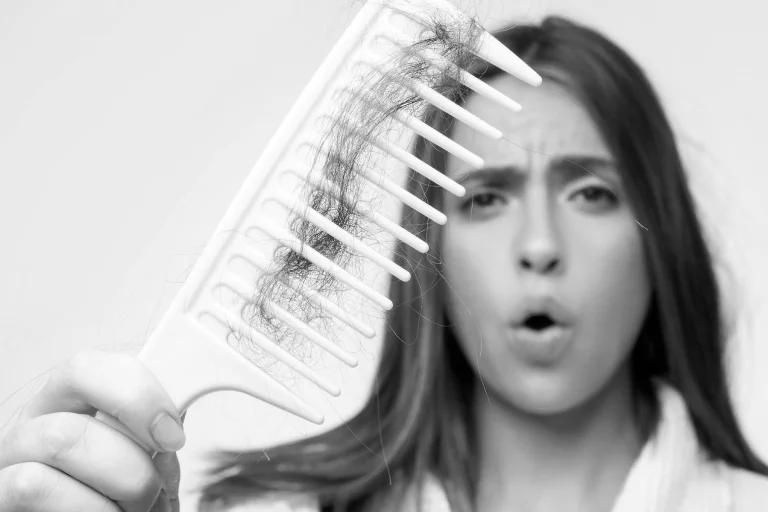
- Home
- About
- Our Team
- Services
- Postoperative Care
- Smile Gallery
- Medical Tourism
- Blog
- Offers
- Contact Us
- Home
- About
- Our Team
- Services
- Postoperative Care
- Smile Gallery
- Medical Tourism
- Blog
- Offers
- Contact Us

Usually, the hair growth cycle involves the shedding of the old hair, and new hair growth replaces it. Likewise, most people will get their new hair replaced and will remain with a head full of hair. However, due to several medical reasons, the lost hair may not grow permanently for some of them. In such cases, if you are looking for a hair loss solution, then you need to know the causes and symptoms of hair loss you are facing. Therefore, we have explained all about the causes of hair loss along with symptoms and treatment options in this blog post.
Everyone has this question, as people normally lose nearly 50-100 hairs daily. But actually, the person whose hair growth cycle stopped or who has thin hair and whose hair fall is happening in clumps is the one who needs an answer to this question. So, our dermatologist team at Oris has answered this question below in detail.
Hair loss can occur due to a combination of factors, including genetics, lifestyle, medical conditions, or environmental influences. Here’s a detailed breakdown of the causes
Hereditary hair loss is also known as androgenetic alopecia and it is the most common cause of hair thinning and baldness. It happens because genetics influence the sensitivity of hair follicle s to androgens, which leads to the gradual miniaturization of hair. Genetic predisposition affects both men and women. where men will experience a receding hairline or bald spots and women will face diffuse thinning across the scalp.
Hormonal fluctuations during pregnancy, menopause, or conditions like polycystic ovary syndrome (PCOS) can trigger hair loss. Hormonal changes affect the hair growth cycle by pushing more hair into the shedding phase. Hormonal changes mostly affect women, but hormonal imbalances in men can also contribute to hair thinning.
Inadequate intake of essential nutrients such as iron, zinc, biotin, and protein leads to nutritional deficiencies, which may lead to hair loss. Nutrients are vital for healthy hair growth, and their deficiency weakens hair strands and slows growth. Individuals with poor diets or absorption issues are mostly affected by hair loss due to nutritional deficiencies.
Conditions such as alopecia areata (autoimmune disease), thyroid disorders, or scalp infections could cause hair loss because illnesses caused by these medical conditions could disrupt the normal hair growth cycle or directly damage hair follicles.
Consulting a healthcare professional to treat hair loss caused by medical conditions is recommended for tailored treatment solutions.
Physical or emotional stress, lack of sleep, and unhealthy habits like smoking could cause stress. Stress-induced hair loss (telogen effluvium) forces a large number of hairs into the shedding phase prematurely. Anyone experiencing chronic stress or lifestyle imbalances could face hair loss.
Chemotherapy, radiation therapy, or drugs for conditions like hypertension, depression, or arthritis could cause hair loss. Medications may interfere with hair growth by altering hormonal levels or damaging hair follicles.
If you experience hair loss while taking medications or receiving treatments, consult a dermatologist for a tailored solution.
Overuse of heat styling tools, harsh chemicals, or tight hairstyles could cause hair loss. These practices weaken hair shafts and can lead to traction alopecia. Individuals who frequently damage their hair through their hair care routines could also be affected by hair loss.
Hair loss manifests in different ways depending on the cause. Recognizing the symptoms early can help you prevent further progression. So, we have listed some of the common symptoms.
Hair loss is not dangerous for life, but it affects us emotionally. It has the ability to change our look, so most people lose hair when they are under stress compared with other causes. Be open and comfortable speaking with a dermatologist regarding the discomfort that hair loss is causing you. Contact Oris Dental Center, as there are solutions for every cause.